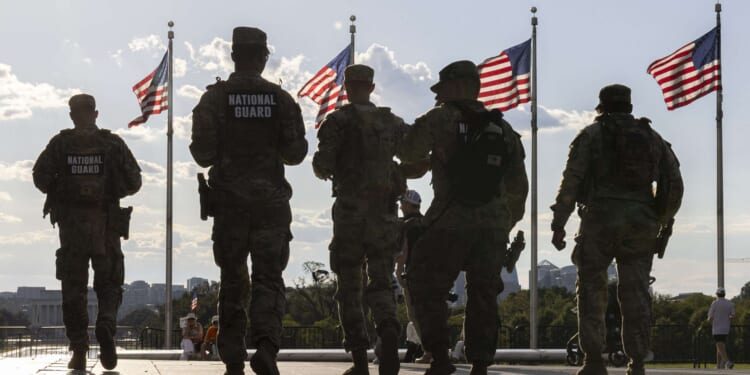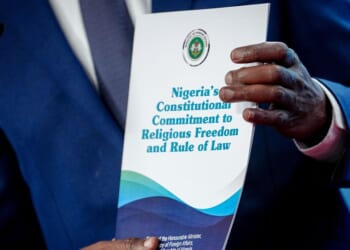He looked young, standing with his feet apart on the upper level of the Dupont Circle Metro station, half in shadow and head to toe in camo. A National Guard member. And in his hand: a tiny packet of Cheetos. He dug into the crinkly bag for the last crumbs as commuters streamed past—ignoring him, pretending not to notice, or nervously pretending they weren’t pretending. You’re not allowed to eat in the D.C. Metro. It’s a rule locals tend to take oddly seriously, like standing on the right of the escalator. But the guardsman wasn’t from here. He didn’t know the rules. He was just a guy from South Carolina or Mississippi or Ohio having a quick snack in a place where he has no business being.
“I am not a dictator,” Trump declared in an August Cabinet meeting. But when it comes to fighting crime, he asserted he has “the right to do anything I want to do,” because “if I think our country is in danger—and it is in danger in these cities—I can do it.”
The president and his administration have offered a mishmash of legal justifications for the National Guard and federal presence in cities over his two terms, including Los Angeles and, in the near future, Chicago.
The president’s assertion that he can do “anything I want to do” with the Guard sidesteps both the Posse Comitatus Act of 1878, which prohibits the use of the military for domestic law enforcement, and the 10th Amendment, which reserves powers to the states. His administration has floated the Insurrection Act of 1807, which permits military force when “unlawful obstructions, combinations, or assemblages” prevent enforcement of federal law, and it has argued that Guard units are exempt from Posse Comitatus limits because, while federally funded, they remain technically under state control. Courts, however, have warned these deployments stretch the law past its breaking point, with a federal judge recently blocking a California deployment as an “unlawful use of troops” that violated constitutional boundaries.
D.C.’s unusual status makes it soft ground for testing the limits of federal incursions in cities, as does our spineless mayor. The administration has cited Section 740 of the Home Rule Act, which allows the president to take control of the Metropolitan Police and the D.C. National Guard during a declared emergency. So here we are, facing masked federal officers at checkpoints and watching armed young men eat junk food in our subways.
It’s “working.” The presence of federal law enforcement can drive crime down, at least in the short term. In neighborhoods where the Guard and federal police have flooded in, carjackings, assaults, and homicides dropped. Polls show that many citizens, tired of theft and violence, welcome the uniforms. To dismiss that desire for order as illegitimate is unserious. People want to be safe, or at least feel safer.
And it’s popular. An August Associated Press–NORC poll found that 81 percent of respondents view crime as a “major problem” in America’s large cities, while 66 percent view it as a “major problem” nationwide. A full 82 percent of Republicans, and 55 percent of respondents overall, consider it “completely or somewhat acceptable” for the military and National Guard to assist local police.
But a military occupation of American cities is neither constitutionally sound nor fiscally viable. Legally and logistically, you can’t solve deep social and policing problems with Humvees parked at intersections forever. These deployments tend to devolve into a high-risk form of political theater, rewarding mayors and presidents who want to look tough while leaving communities no closer to a lasting solution and America one step closer to authoritarian rule.
The idea of uniformed federal agents patrolling city neighborhoods as if they were appropriate for everyday law enforcement feels profoundly out of step with the spirit of America’s founding values as we approach the semiquincentennial. The Constitution’s architecture was designed to prevent just this kind of centralization where a standing force functions not as a last resort but as a default mode. Letting soldiers or masked federal officers replace traditional policing undermines the boundary between citizen and subject.
The Cheetos guardsman at Dupont Circle is the perfect symbol of our era: a kid far from home, overdressed, tasked with a job he shouldn’t have, bored and a little hungry. A nation that chooses this as its answer to crime has lost the thread of both constitutional limits and sustainable governance.
This article originally appeared in print under the headline “Cheetos in the Capital.”

















